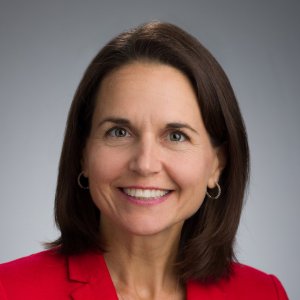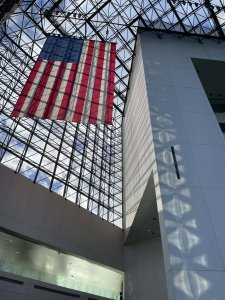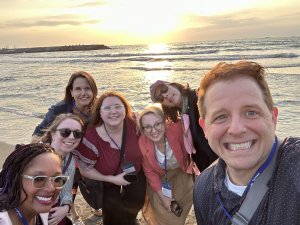When I received notification that I was selected as a grantee of the International Education Administrator Fulbright Tawain award, my emotions were met with overwhelming joy and gratitude, but also anxiety. I resorted back to my 21-year-old self that had been recently admitted to a study abroad exchange program in Paris, France. Back then, my anxiety was rooted in my lack of knowledge of my ability to navigate not only a foreign land, but also a large city, without the help or support of my family and friends. Over twenty years later, I had not spent the intermittent years becoming a well-versed, independent world traveler. Securing my PhD, getting married, and having four children had grounded my travel ambitions. But I was finally at a point where my children were old enough that I could make the bold decision to fly half-way across the world to spend two weeks in Taiwan, a land that seemed even more culturally removed than France. With this new opportunity to travel to Taiwan, the source of my anxiety expanded well beyond what it had been leading up to my travel to Paris all those years ago. Would I be safe and welcomed in Taiwan in a way that would make it seem worth it to be away from my family, friends, and work for what felt like a very long time?
When I arrived in Taiwan, it didn’t take long for my anxiety to ease. I arrived early in the morning and received friendly and helpful advice of where to go for the most authentic breakfast. Although my Mandarin was limited to only a couple of polite words, the locals didn’t seem to mind speaking to me in English and met my inquiries with refreshing smiles and an appreciation of my xièxiè for their help. As I wandered Taipei until my hotel room was ready, I was invited into the buildings of Bopiliao Historic Block to stay out of the rain and to learn about the intriguing background of the area. I eventually made my way to the Lungshan Temple and sat in peace as I absorbed the beauty of the Taiwanese people and the spiritual richness of an overwhelmingly sacred space. By the end of that first day, when my tiredness was at its peak, I felt desperate for a simple and convenient meal that would hold me over until morning. I was so appreciative of the owner of a produce store who stayed open five minutes late to allow me to make purchases that gave me comfort. Her eyes told me that she understood my tiredness and knew that I was still unsure of my next steps within a foreign land. Her help and kind words told me that the next fourteen days were going to be just fine and that the Taiwanese people would take care of me as a welcomed guest.
When Monday arrived, and I finally connected with the Fulbright staff and my IEA peers, I still couldn’t fully foresee the specialness of the next two weeks. The thoughtfulness of our itinerary was unparalleled. The Fulbright staff intuitively understood, and made happen, site visits and partnerships that would round out my knowledge of a country that is deeply committed to education. As I sat through the welcome presentation, I was excited by the prospect of visiting the Ministry of Education, the American Institute in Taiwan, an elementary school, a Buddhist university, an art university, and a Chinese medicine school! The list of intriguing adventures made me feel as though I was about to embark on a tremendously special two weeks. My instincts were correct, as each of the next days showed me just how much the world can learn from the small and nimble Taiwan, a true leader in providing students with a cutting-edge, engaging, and affordable education that prepares them to be excellent citizens of the world. As each day passed, I also experienced the added joy of getting to know fifteen talented, kind, and loving American educators who shared a collective love of exposing college students to the beautiful possibilities of international travel and the learning that comes from embracing cultures, customs, and people that are different from one’s own.
As our bus made its way from Taipei to Yilin, with great interest I noticed the transition in vegetation, the neatly lined houses surrounded by wet land and rice patties, the rising landscape and heaviness of the damp air. As we turned each curve, making our way to Fo Guang University, I immediately sensed the specialness of the place. My own practice of meditation and consumption of vegan meals made me eager to see what else I could absorb from a Buddhist university. Our Fulbright team were welcomed with a delicious vegan meal, leaving each plate free of waste, and each soul renewed and ready to explore. Between the beautiful landscape, kind faculty and staff, and relaxed presentations, I was at peace. I could easily see how my students, studying leadership, could benefit from the serenity of Fo Guang as a way of augmenting their capacity to lead within a turbulent world.
After filling two plates with delicacies that almost looked too pretty to eat, I was proud of my decision to invite myself to have lunch with three National Chengchi University (NCCU) faculty. Without another Fulbright grantee to balance the conversation, I wondered if the lunch would be awkward. I ended up being surrounded by the most delightful, open, and entertaining people. We spoke about research. We spoke about professional backgrounds. We spoke about the United States. We spoke about Taiwan. In less than an hour, everyone seemed uplifted by our exchange, with the natural benefit of relaxation that comes after a few good laughs. I have since exchanged emails with one faculty member that may lead to a research project, a bonus that went beyond the scope of my Fulbright assignment. With NCCU’s strong fit with my school, I hoped that my students would have the opportunity to meet such excellent faculty and to observe a library that is hard to describe in words.
I couldn’t stop taking pictures. The museum was filled with so much history and information that was very far removed from my Western upbringing. I thought, with appreciation, that the Chinese Medical University made the right decision by taking us to their museum. Snapshot after snapshot, I hoped that my camera would help me to remember everything that I was being told. As I hung on the tour guide’s every word, I kept wishing that Chinese medicine was more mainstream back home. To know the right herbs to assist with common ailments, or to be educated on acupuncture as a treatment for pain management; it seemed that these practices could lower the high cost of medical care in the United States. Although I do not work for a medical school, I still had the keen reaction that my students would benefit from learning more about Chinese medicine, if only to expand their thinking to new possibilities that are in fact not new at all but centuries old.
If I were to fully express the many special conversations and joyful experiences that I had throughout my educational tour of Taiwan, my essay would easily quadruple in length! I never knew that I would learn so much about semiconductors. I thought, “wow, my artistic daughter would love this place” when we visited Tainan National University of the Arts. I thought about my faculty, and how some of them would be thrilled to teach over summer at Tunghai University. I contemplated the possibility that my School of Management and Labor Relations may have a unique perspective that could benefit the National Kaohsiung University of Hospitality and Tourism. I was thrilled to learn that one of the most beautiful universities by the ocean, National Sun Yat-sen University, already has a partnership with my university, leading me to conclude that “my students just need to get here!”
After traveling back to the United States and going to work Monday morning, each colleague I encountered greeted with me with the curious question: “How was Taiwan?” My common refrain was: “What an amazing, gorgeous country! The Taiwanese people spoiled me in a way that I might not ever experience again; fantastic hospitality, deep kindness, exceptional gifts, and oh, the food! How I loved the food, but even more so, the beautiful faces and company of our many incredible hosts.” As I organized my notes from my adventurous two weeks, I created a list of over ten opportunities in Taiwan that I plan to investigate in more detail. As my Spring semester draws to a close, I will be able to more thoroughly exchange possibilities with my Taiwanese partners, brokering what I hope will result in faculty-led study abroad experiences, additional exchange opportunities, and joint curricular agreements. I will also report my findings to other schools within my university, such as the School of Engineering, and Rutgers Global—a unit that is interested in international internship opportunities for Rutgers students. Beyond my desires to repay Taiwan for their kindness by creating further, lasting partnerships, I am also driven to move forward with my next steps because of my high confidence that Taiwan is a country that my students need to experience for themselves. My intrigue and love of Taiwan is strong enough that I plan to bring my husband and four children to Taiwan in the coming years, because of all the places to visit in the world, Taiwan is not to be missed.





